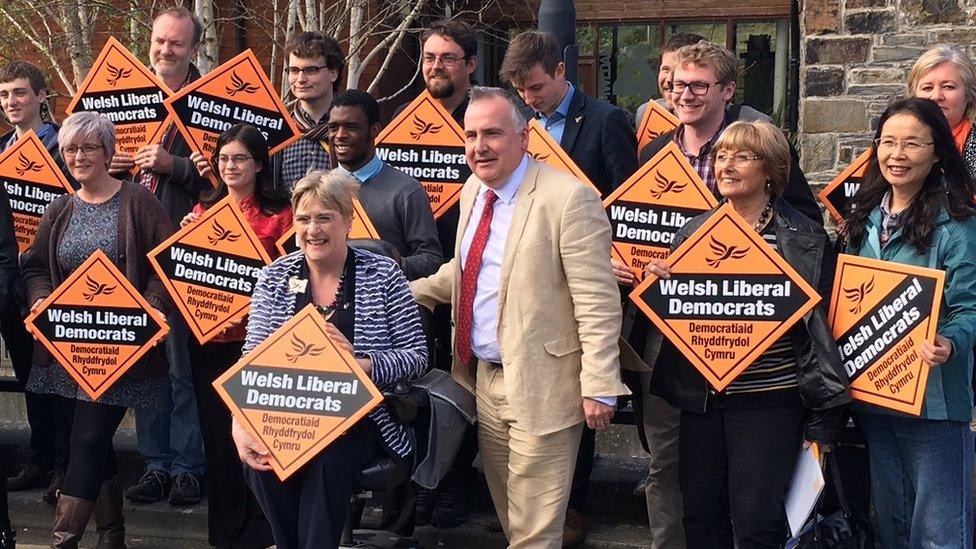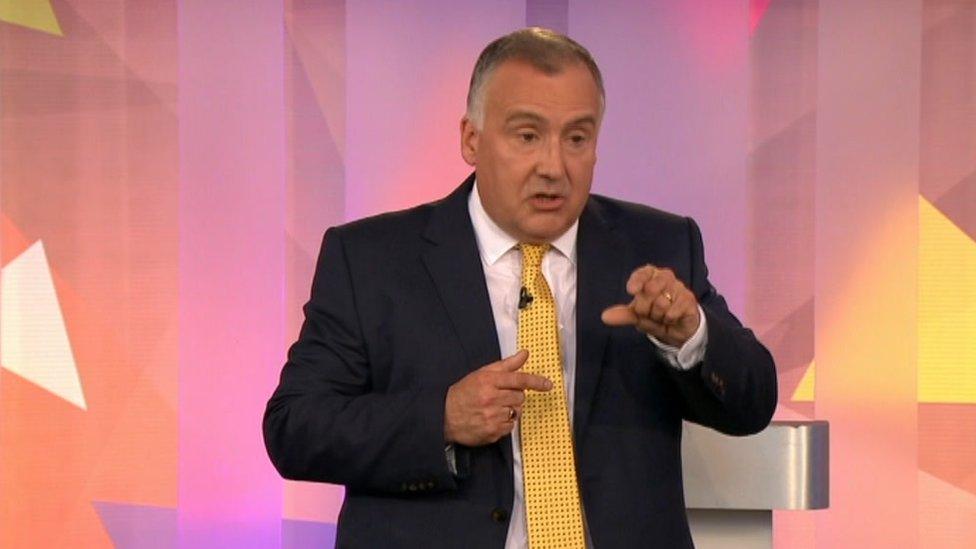General election: Expert view on the Welsh Lib Dems
- Published

Mark Williams (centre) and the Lib Dems did not get a boost from the local elections in May
Nye Davies of Cardiff University's Wales Governance Centre profiles the Welsh Liberal Democrats' campaign.
After the vote to leave the EU, many might have expected the Liberal Democrats to position themselves as the main opposition to the Conservatives on Brexit.
The party campaigned heavily for Britain to remain a member of the EU - if this election is about Brexit, surely the Lib Dems will be able to pick up a number of votes from those who wanted to remain?
Also, the party would be hoping to win over voters disillusioned with the current turmoil in the Labour Party. Unfortunately for the Lib Dems, the hoped-for fight back has not materialised.
The party has faced major difficulties following Nick Clegg's decision to go into coalition with the Conservatives in 2010.
It was to have a disastrous effect on the party - it lost 49 of its 57 seats in the 2015 general election, with its vote share falling by 15 percentage points.
The fallout also affected the results of the 2016 Welsh Assembly election with the party losing four of its five seats, only retaining Kirsty Williams's seat of Brecon and Radnorshire. Since then, Mark Williams has become leader of the Welsh Lib Dems while Kirsty Williams has become education secretary in the Labour-run Welsh Government.
The Lib Dem leader Tim Farron has attempted to present the party as the only opposition to the Tories and hard Brexit, external.
There were early hopes for the Lib Dems that this would be successful.
The by-election victory in Richmond Park in December was fought on the issue of Brexit by Sarah Olney who managed to overturn a 23,015 Conservative majority. This significant result was a cause for optimism for the party - if Brexit is the main issue for voters this election then they would be hoping to maintain this level of success.
In Wales, as across the UK, a Lib Dem fight back has not materialised.
According to my colleague Prof Roger Scully, the party has not made a significant improvement in opinion polls since 2015. The narrative of the election thus far has centred on May vs Corbyn, meaning the Lib Dems are struggling to break through.
The most recent Welsh polling, external has suggested that the two main parties are squeezing votes from the smaller parties. As such, this has created a very tough presidential-style campaign which has made it tough for the Lib Dems to compete.
This might be because the electorate in Wales does not seem to have much faith in Mr Farron himself. Recent data found that he was less popular than every UK and Welsh party leader except for UKIP's Paul Nuttall and Neil Hamilton.
More worryingly for the party in Wales, results showed that Welsh leader Mark Williams was the least visible party leader by some distance compared to UK and Welsh party leaders. If Welsh Labour is successful in making this an election on Welsh issues, the Lib Dems might struggle for visibility in Wales.
If current polling data is correct, the party should hold on to its only seat in Wales, Ceredigion.
The seat has traditionally been a Liberal seat, stretching back to Sir Thomas Lloyd in 1865, with only brief periods of it changing hands - Thomas Edward Lloyd for the Conservatives in 1874 and Elystan Morgan for Labour in 1966.
However, despite Mark Williams having held Ceredigion since 2005, it was held by Plaid Cymru from 1992 to 2005. Plaid will be targeting this seat, with the difference in vote share between the two parties only being about 3,000.
Plaid's Elin Jones has also held the assembly seat of Ceredigion since 1999. If Plaid can run a very good campaign in Ceredigion, Mark Williams could be at risk.
Many Lib Dem supporters might have assumed that there would be a surge in support for the party from Remainers after the Brexit vote.
However, that surge has not happened and the party faces another difficult election. If the party cannot make a comeback now in a Brexit election and with the Labour Party supposedly in turmoil, it might have to face a long time before it reaches pre-2010 heights.
- Published26 May 2017
